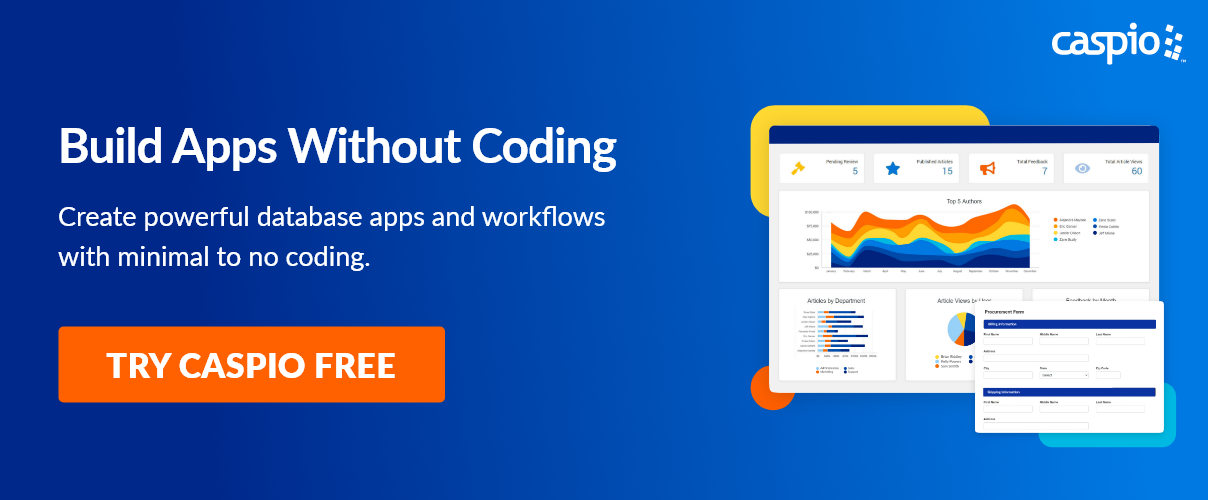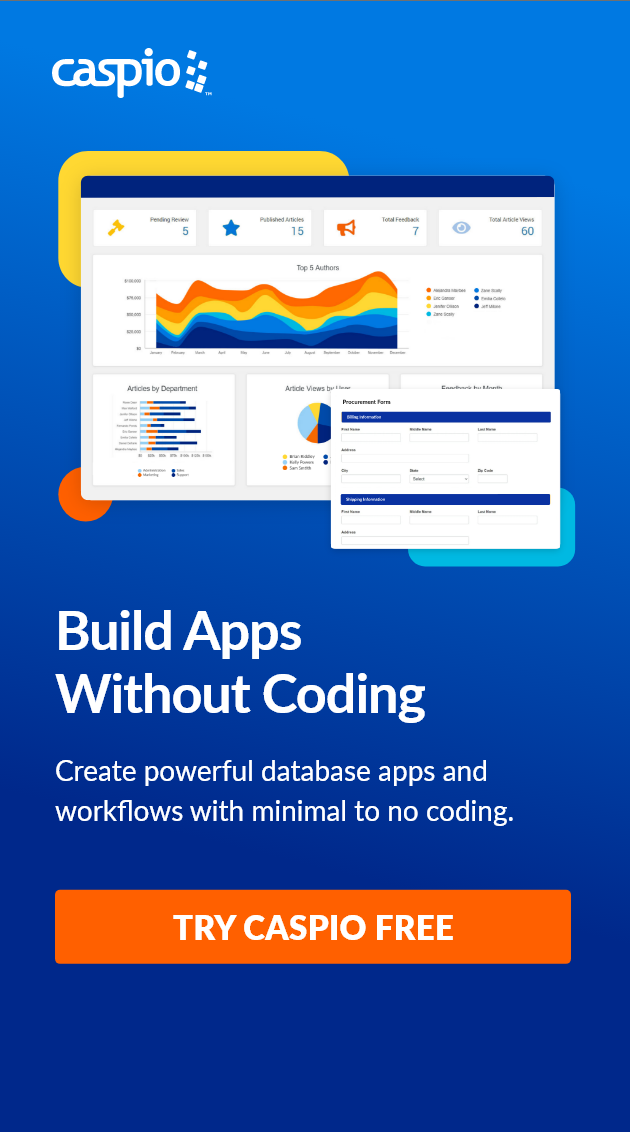Why Arizona Autism Replaced Quickbase With Caspio to Scale Securely and Cut Costs
November 12, 2025

At a Glance:
- Organization: Arizona Autism
- Industry: Healthcare – Developmental Disabilities
- Challenge: High-cost software, fragmented systems, and compliance risk under Medicaid and DDD regulations
- Solution: Migration from Quickbase to Caspio, with Solutions LC architecting a unified, HIPAA-compliant low-code application suite
- Results:
- Reduced software costs by nearly 80%
- Centralized staff and client records for unified visibility
- Automated compliance workflows
In healthcare, the mission is clear: serve patients, stay compliant, and do it all at scale. But behind that mission often lies a tangle of systems, spreadsheets, and software that weren’t built for the complexities of modern healthcare delivery.
For Ryan Sherman, founder of Arizona Autism, those limitations were becoming impossible to ignore. What began in 2012 as a small occupational therapy practice had grown into one of the largest providers of developmental disability services in the Southwest, with thousands of clients, hundreds of administrative users, and an ongoing need to stay aligned with ever-evolving Medicaid and DDD (Division of Developmental Disabilities) policies.
By 2022, Arizona Autism’s operations were running on Quickbase, and straining under it. The system that once seemed flexible had become costly and convoluted.
“Quickbase called me and said, ‘Your applications are in the 99th percentile for complexity,’” Ryan recalled. “The cost structure had become absurd.”
That triggered a full platform transition: one that would span dozens of workflows, multiple companies, and tens of thousands of records.
Rebuilding on Caspio With a Partnered Approach
To rebuild the organization’s digital infrastructure, Ryan partnered with Brian Ingle, a seasoned enterprise IT consultant and Caspio Silver Partner through his firm, Solutions LC. Together, they selected Caspio’s HIPAA-compliant low-code platform as the foundation for a more scalable, unified solution.
One of the major hurdles in Quickbase was the inability to share data effectively across applications. “We had to duplicate the data between the tables,” Ryan explained. “That was the central item that Caspio resolved for us”. Caspio’s ability to use shared tables meant that staff and client records could be managed in one place and accessed securely by multiple departments, something Quickbase could not support without complex and costly integrations.
This foundational shift created both technical and operational clarity. As Brian noted, “Even though they’re sharing the same data from the same tables, we can allow that to be shared securely. We build the authorizations and roles on top of it”. Caspio’s role-based access and record-level security became the backbone of the new system.
Aligning With DDD and Evolving State Requirements
But unifying data was only half the battle. As a Medicaid provider, Arizona Autism also needed to respond to state policy changes with precision, especially from the Division of Developmental Disabilities.
Idalia Ibarra, HCBS (Home and Community Based Services) Director, emphasized how dynamic those requirements can be: “We work a lot with the government and their specific policies, specifically policies within DDD, that are ever-changing,” she said.
While the Caspio system was still under construction, new regulatory requirements came down. Instead of delaying rollout or compromising accuracy, Idalia and her team simply adjusted their workflows, without needing code.
In the previous system, that kind of agility wasn’t possible. Administrators would often create “roundabout solutions” just to get their work done, increasing compliance risk and data clutter.
“There was a lot of information they didn’t need access to,” Idalia explained. “Now with Caspio, we’ve defined who sees what. It’s much easier to ensure we’re staying compliant”.
Measurable Efficiency and Real Cost Reduction
The financial impact of switching to Caspio was immediate. “The cost was by far the biggest measurable impact,” Ryan said. “We get more for less money, around five times cheaper”.
Operationally, the gains extended far beyond budgeting. Caspio’s platform enabled the team to automate many of the manual workflows that previously slowed them down, including staff onboarding, client-service matching, document tracking, and performance auditing.
“Some of the applications from Quickbase were overengineered,” Ryan reflected. “With Caspio, we cut out the fluff. Even though it’s a complex setup, it’s now clean, direct, and far easier to manage”.
Refocusing Teams on What Matters
For Idalia’s department, the largest administrative team within Arizona Autism, the shift to Caspio freed up time and mental bandwidth. “We’re now able to focus more on the relational aspect of our work,” she said. “Caspio is handling the transactional side, status updates, triggers, documentation, so our people can focus on supporting clients and families”.
She emphasized that while the transition required training and adjustment, the results were clear: better process control, cleaner data, and stronger confidence in day-to-day operations. “It was a shock at first because everything was so much cleaner, more structured,” Idalia said. “Now our staff is asking for even more tools”.
Looking Ahead: AI-Driven Healthcare Operations
Ryan and Brian are now piloting AI-enhanced features that allow staff to interact with Caspio apps using natural language. “We’re working on a chatbot interface where someone could ask: What phase is Jane Doe in? Or who is available in zip code 85022?” Ryan explained.
The goal is to eliminate the time spent searching through individual records. Brian added, “We figured out a way to securely ask the chatbot questions and are training it to respond using Caspio data”.
This layer of intelligent interaction has the potential to further improve staff efficiency, reduce time spent navigating apps, and enable faster responses to client needs.
Final Takeaway
Arizona Autism’s replatforming from Quickbase to Caspio wasn’t just a technical upgrade, it was a strategic transformation. By leveraging a low-code platform built for compliance and scale, the organization was able to consolidate fragmented systems, reduce cost, enforce DDD and Medicaid-aligned processes, and build toward a future of intelligent automation.
“There’s no out-of-the-box system that would work for our complexity,” Ryan said. “We have 4,000 employees and thousands of clients, Caspio finally gives us a system that works at our scale”.
Learn More
Explore how Caspio can help your healthcare organization build HIPAA-compliant, scalable, low-code applications.
Start your free trial today


Recommended Articles

How a Two-Person Team Digitized Tribal Health Across the Southwest Using Caspio
READ STORY
12 Caspio Features You Might Be Overlooking
READ STORY
When Off-the-Shelf Isn’t Enough: Build an Inventory System That Fits
READ STORY
Vibe Coding vs. Low-Code: Where Caspio Fits in the Future of Application Development
READ STORY
Build a SaaS Startup Without a CTO: How Low Code Empowers Solo Founders
READ STORY
Can Low-Code Platforms Support Enterprise Apps
READ STORY
Build an AI-Enhanced Applicant Tracking System With No-Code
READ STORY
Turn Your Database Into an AI Workflow Engine With Caspio
READ STORY
How LLMs Understand Your Product: Insights From Caspio
READ STORY
Top 10 Lessons From Non-Developers Who Innovated With Caspio
READ STORY
Responsible AI in Action: Secure LLM Integration
READ STORY
Build Your Own Clinical Data Management App
READ STORY
